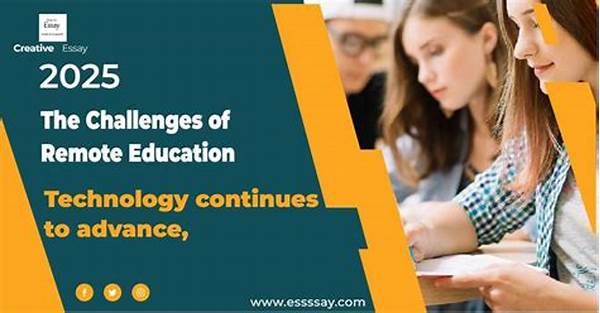In the ever-evolving landscape of education, the shift to remote learning has brought with it a unique set of hurdles. As classrooms moved online, both educators and students have had to navigate new territory. The shift, while necessary in the pandemic era, has magnified several underlying issues within the education system. Addressing these challenges in remote education is crucial for ensuring quality learning experiences for all.
Technological Barriers
One of the most significant challenges in remote education is the technological barrier. Many students, particularly those in underserved communities, lack access to reliable internet and modern devices, making it difficult to participate in online classes. Additionally, educators who are not technologically savvy may struggle to effectively use digital tools to engage students. This digital divide exacerbates existing educational inequities, leaving some students at a disadvantage simply because of their circumstances. To overcome these challenges in remote education, both infrastructure improvements and comprehensive training for educators are essential. Ensuring that all students have equal access to necessary resources is a step toward leveling the educational playing field.
Engagement and Interaction
Keeping students engaged in a virtual classroom is one of the most pressing challenges in remote education. The absence of physical presence can lead to a lack of motivation and focus among students. Teachers must find innovative ways to capture their students’ interest and foster interaction. This often requires a shift from traditional teaching methods to more interactive and dynamic approaches tailored for the online environment.
Assessment and Feedback
The challenges in remote education also extend to assessment and feedback. Online exams can pose issues related to honesty and integrity, while providing timely and effective feedback in a virtual setting can be challenging for educators. These challenges necessitate the development of new assessment methods that are fair and effective.
Adapting Curriculum
Adapting the curriculum to fit an online format presents another set of challenges in remote education. Educators must rethink and redesign their lesson plans to ensure that they are suitable for virtual delivery. This process often requires significant time and effort, as well as creativity and flexibility, on the part of teachers.
Emotional and Social Impact
Remote learning can also have a profound emotional and social impact on students. The lack of face-to-face interaction may lead to feelings of isolation and anxiety. Addressing these challenges in remote education involves providing support systems for students to maintain their well-being and fostering a sense of community, even from afar.
Teacher Training
Adequate teacher training is vital to overcoming the challenges in remote education. Educators need to be well-equipped with the skills and tools necessary for effective online teaching. Professional development opportunities can help teachers navigate the remote learning landscape more confidently and successfully.
Parental Involvement
Parental involvement has taken on new importance in remote education. Parents are often required to take a more active role in their child’s learning process. This shift presents challenges in remote education as not all parents have the time or resources to support their children’s education effectively.
Bridging the Digital Divide
Efforts to bridge the digital divide are crucial in addressing challenges in remote education. Ensuring all students have access to the required technology is the first step in achieving educational equity in a virtual learning environment.
Privacy and Security
Privacy and security concerns pose additional challenges in remote education. With the increased use of digital platforms, protecting student data and ensuring safe online interactions are paramount. Schools must implement comprehensive security measures to safeguard against potential breaches.
Future of Education
While remote education poses numerous challenges, it also offers opportunities for future growth and transformation in the education sector. By addressing these challenges, educators can prepare for a more flexible and accessible future, where learning can happen anywhere, at any time.
Personalizing Remote Education
Personalizing remote education to meet the diverse needs of students is crucial. Each student has unique learning preferences and challenges, requiring tailored approaches. By incorporating diverse educational resources and adaptive learning technologies, educators can help bridge gaps and address the persistent challenges in remote education.
